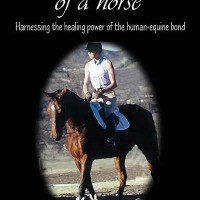According to Shawn Alchor, the winner of over a dozen distinguished teaching awards at Harvard University, and the CEO of Good Think Inc., a Cambridge-based consulting firm which researches positive outliers, 90% of happiness can be predicted not by what surrounds a person (the environment), but rather how he/she experiences this environment.
Alchor, who has used a 21 day gratitude list intervention in a variety of different settings in forty-two different countries, explains that when a person’s mood is more positive, dopamine levels shoot up, and the learning centers of the brain turn on.
Now, the Harvard professor continues, the person is primed to scan the environment not for the negative, but instead, for the positive. Interestingly, dopamine — the pleasure detector in the brain — also shoots up when bonding with another person, or animal.
But the reason this may be particularly relevant to the equine therapy field? Well, bonding is not an instant act. According to Sherry Turkle, the author of “Alone Together: Why We Expect More from Technology and Less from Each Other” (http://alonetogetherbook.com/), what online communication offers is a pseudo form of instant connection, that allows us to demand connection just how we want it, and when we want it.
The problem is, according to Turkle, it’s not real connection. Not only is it not face-to-face, but also, the same neurochemical responses to bonding just don’t happen over the internet.
So how do so many people turn to this form of communication? As Turkle explains, it’s easier. However, as she continues, it also leaves us quite lonely. And in a troubling way, the more we do it, the harder it is to do the real form of connecting — face-to-face bonding that is.
This is exactly why equine therapy might just be a way for us to relearn connection, and in the process, reap the benefits of the dopamine rise that Alchor describes. Horses, after all, despite their imposing stature, do not connect any other way than organically, and, in a world full of false connections, this might just be exactly what we need.
Best,
Claire Dorotik LMFT
